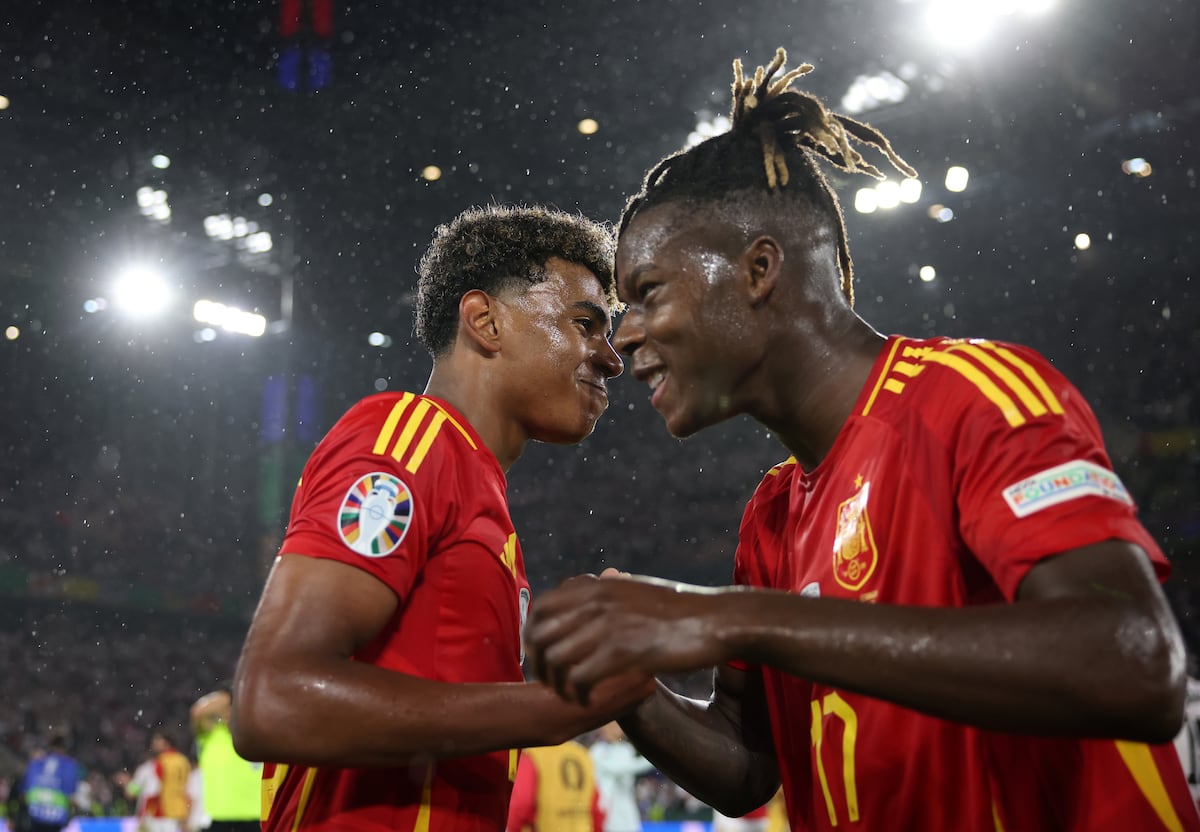Success of the most pluralistic Spain | Eurocup Germany 2024

“In life and in football, Iñaki opened many doors for me. Not only me, but also black people.” The statement bears the stamp of Nico Williams (Pamplona, 21), one of the sensations of the Eurocup. He talks about his brother: Iñaki (Bilbao, 30). “You already know my story,” Iñaki recalled at the event last year where his mother was awarded the badge of sports ambassador. Felix Williams and María Artuer, originally from Ghana, crossed the Sahara Desert and crossed the fence of Melilla. They were looking for a better future; or simply the future. It was 1994 and María was pregnant. A few months later, Iñaki was born in Bilbao, named after Iñaki Mardones, the priest who helped the couple settle in the Basque Country. 21 years later, Iñaki became the first black player to score a goal in an Athletic shirt.
In 1995, according to the UN, the number of immigrants in Spain approached one million, or 2.51% of the total population. “I’m trying to somehow represent all the migrants here. It seemed that a black man couldn’t play for Athletic, that you had to be Olentzero’s son to do so. But that prejudice has been erased,” Iñaki raised his voice. His dream had moved from Bilbao to Las Rozas. It was in a match in May 2016. “Iñaki left a legacy. Before, you couldn’t see black players at Athletic, but today there are a lot of guys in the youth team. My brother and I used to be there. Today, you can see a Latin American, a Moroccan or a Guinean. It’s a mix of cultures. And I think my brother made it possible,” concludes Nico.
Williams, along with Lamine Jamal (Barcelona, 16), are the only children of immigrants to wear the Spanish shirt in Germany. There would have been three of them if Alejandro Baldé (Barcelona, 20) had not been injured. At the World Cup in Qatar, there were four: Williams, Ansu Fati (Guinea, 21), Baldé and Roberto Sánchez (Cartagena, 26). A multiracial team is beginning to take shape, a different red than the one Vicente Engonga faced at the end of the last century. “My father was known as the black Vicente in Cantabria. And I think I was the first to play for Spain,” recalls Engonga (Barcelona, 58), who played 11 times for La Roja, part of the group that played in the 2000 European Cup.
Donato, who is black, wore the Spain shirt in 1996, as did Catania at the 2002 World Cup and Marcos Senna at the 2008 European Championship. However, all three are Brazilians. The current team also includes players born abroad: Le Normand and Laporte (France), as well as Joselu (Germany). “It’s in keeping with the times. Spain in the 60s and 70s was not a country of immigrants like France or Germany. I like the combination in the sport I love. It makes the teams much better,” adds the former Valladolid, Celta, Mallorca and Valencia player.
According to the same UN data, published by Expansión, between 1995 and 2010, the number of immigrants in Spain increased sixfold, from one million to around 6.2 million. The Royal Spanish Football Federation (RFEF) has followed this evolution closely. “We analyse, depending on each generation, around 200 players a year,” explains Francis Hernández, coordinator of the La Roja quarry; “We have done a very meticulous job of creating a database of names and surnames. From the ’96 generation to the 2010 generation, we have found 125 players who could have played for two or more federations.” Among these 125 are Nico and Lamine. The Athletic Bilbao player could have played for Ghana, like his brother Iñaki, and the Barcelona player for Morocco. “Lamine has a very important connection with our country, like Nico. Of these 125 players, 107 have chosen to play for the Spanish national team. 85% choose us. They are looked after here. They feel important, which is very important for a footballer,” explains Francis Hernandez. Achraf Hakimi (Madrid, 26), on the other hand, has chosen Morocco. “I was in Spain when I was young, but it wasn’t my place,” he stressed in an interview with Marca. Just like Alejandro Garnacho (Madrid, 20), who chose Argentina.
“I always tried my best to work with Athletic to be (with the Spanish national team), but I had to go another way,” Iñaki Williams recalled in an interview with EL PAÍS about his decision to play for Ghana. Otto Addo, the coach of the African team, added: “Nico, on the other hand, decided to go to Spain. “It may have been the right decision, but it was not an easy one.” Spain’s demographic map is evolving, and so are the choices. “Compared to 15 years ago, we are going through a moment in which racial people are knocking on the door to have more representation. However, we see that this representation exists more in sport than in other areas,” explains Abdoulaye Fall, a member of the European Commission’s Expert Group on Migration. Sociologist Sebastian Rinken concludes: “This is another symptom of the demographic change in Europe. And since football is the sport with the greatest public recognition and media visibility, this change can have very positive consequences.”
The message of Nico Williams and Lamin Yamal at the Eurocup is very powerful: they are not only talking about football, they are talking about the many Spains.
You can follow EL PAÍS Deportes on Facebook And Xor sign up here to receive our weekly newsletter.
Subscribe to continue reading
Read without restrictions
_
